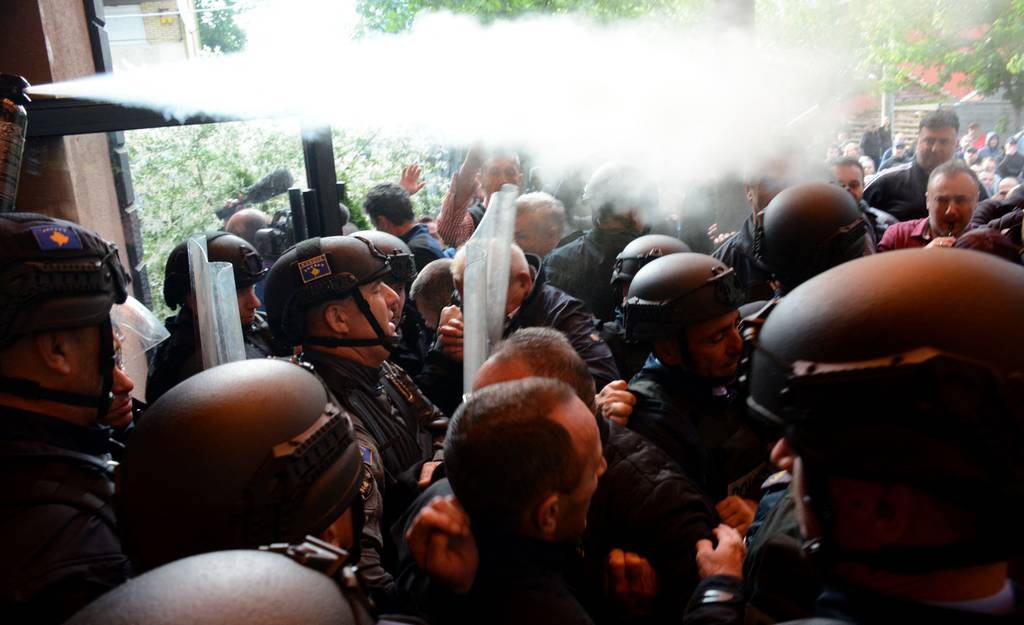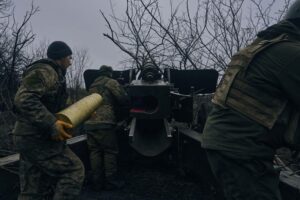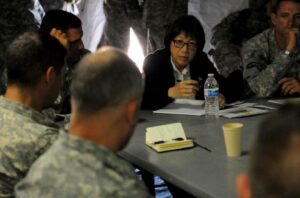
WASHINGTON ―The Senate’s draft annual defense bill would add Kosovo to the list of eastern European countries eligible for U.S. military training amid heightened tensions in the Balkans.
The fiscal 2024 National Defense Authorization Act, which the Senate is slated to begin debating this week, allows Kosovo to engage in U.S.-led military exercises to increase interoperability with NATO forces. Doing so would allow Kosovo to receive reimbursements for training via multilateral military exercises with NATO and NATO Partnership for Peace members, a list of countries that includes its rival Serbia.
As a NATO Partnership for Peace member, Serbia regularly hosts the Platinum Wolf military exercises with the U.S. and its NATO allies and intends to do so again this year amid its acrimony with Kosovo.
“The committee commends Department of Defense efforts to support the Republic of Kosovo as it works to develop and enhance its national security forces, particularly efforts to enhance professionalization, increase interoperability and bolster Kosovo’s ability to respond to external and hybrid threats,” a committee report accompanying the bill stated.
The report also notes that the Senate Armed Services Committee “supports expanding cybersecurity cooperation” with the Kosovar armed forces, directing Defense Secretary Lloyd Austin to brief Congress on efforts to do so by the end of the year.
“The committee believes that the Department of Defense should identify areas to further existing cybersecurity cooperation and also new opportunities to strengthen the bilateral partnership,” states the report.
The Senate Armed Services Committee advanced the bill 24-1 in June.
The effort to deepen U.S.-Kosovar military ties comes as the Biden administration and numerous lawmakers seek to temper Pristina’s deteriorating relations with Serbia amid increasing tensions between Albanian and Serb communities within Kosovo.
The House Foreign Affairs Committee held a hearing on the issue on July 18, though lawmakers have differed somewhat on how much pressure to apply to Kosovo, versus Serbia, in the dispute.
“The government of Kosovo must engage on the implementation of an association of Serb-majority municipalities as it committed to do 10 years ago,” Europe subcommittee Chairman Thomas Kean, R-N.J., said at the hearing. “However, the U.S. must ensure [the association] protects the right of Kosovo Serbs without undermining Kosovo’s authority over its sovereign territory.”
Violence erupted in northern Kosovo’s Serb-majority municipalities after Pristina installed Albanian mayors, who had won elections following a Serb boycott. Serbian President Aleksandar Vucic had sharply criticized the elections and supported the boycott.
The U.S. and European Union have called on Kosovo to hold fresh elections in the municipalities, and Deputy Secretary of State for Eurasian Affairs Gabriel Escobar said in June that failure to do so could affect Pristina’s aspirations to join NATO and the EU.
“Our singular request was that Kosovo not try to install the mayors by force where there were protests occurring,” Escobar told the Foreign Affairs Committee on Tuesday. “In the meantime, we have been very tough on Serbia.”
Escobar noted that the U.S. has “gotten pledges” from Serbia not to oppose the new elections “and there are consequences for Serbia should they oppose this.”
Bryant Harris is the Congress reporter for Defense News. He has covered U.S. foreign policy, national security, international affairs and politics in Washington since 2014. He has also written for Foreign Policy, Al-Monitor, Al Jazeera English and IPS News.
- SEO Powered Content & PR Distribution. Get Amplified Today.
- PlatoData.Network Vertical Generative Ai. Empower Yourself. Access Here.
- PlatoAiStream. Web3 Intelligence. Knowledge Amplified. Access Here.
- PlatoESG. Automotive / EVs, Carbon, CleanTech, Energy, Environment, Solar, Waste Management. Access Here.
- BlockOffsets. Modernizing Environmental Offset Ownership. Access Here.
- Source: https://www.defensenews.com/congress/2023/07/19/senate-defense-bill-grants-us-training-assistance-to-kosovo/
- :has
- :is
- :not
- :where
- 10
- 12
- 2014
- 2024
- 70
- a
- ability
- Act
- add
- administration
- advanced
- Affairs
- affect
- After
- again
- ago
- AL
- allow
- allows
- also
- Amid
- an
- and
- annual
- Apply
- ARE
- areas
- armed
- AS
- Assistance
- Association
- At
- austin
- authority
- authorization
- been
- begin
- believes
- between
- biden
- Biden Administration
- Bill
- bolster
- by
- called
- chairman
- comes
- committed
- committee
- Communities
- Congress
- Consequences
- cooperation
- could
- countries
- covered
- Cybersecurity
- debating
- Deepen
- Defense
- Department
- department of defense
- deputy
- develop
- directing
- Dispute
- do
- doing
- draft
- eastern
- effort
- efforts
- Elections
- eligible
- end
- engage
- English
- enhance
- ensure
- EU
- Europe
- European
- European Countries
- european union
- existing
- expanding
- external
- Failure
- Fiscal
- following
- For
- Force
- Forces
- foreign
- foreign policy
- fresh
- from
- further
- Government
- grants
- had
- Have
- he
- hearing
- heightened
- Held
- hold
- hosts
- House
- How
- HTTPS
- Hybrid
- identify
- images
- implementation
- in
- includes
- Increase
- increasing
- install
- intends
- International
- Interoperability
- issue
- IT
- ITS
- join
- jpg
- July
- june
- lawmakers
- List
- Mayors
- meantime
- member
- Members
- Military
- much
- multilateral
- Municipalities
- must
- National
- national security
- New
- news
- noted
- Notes
- numerous
- occurring
- of
- on
- opportunities
- oppose
- over
- particularly
- Partnership
- peace
- platinum
- plato
- Plato Data Intelligence
- PlatoData
- policy
- politics
- president
- pressure
- Protests
- receive
- regularly
- relations
- report
- reporter
- Republic
- request
- Respond
- right
- Rival
- s
- Said
- secretary
- security
- Seek
- Senate
- Services
- should
- since
- singular
- So
- somewhat
- sovereign
- State
- stated
- States
- Strengthen
- subcommittee
- support
- Supported
- tensions
- territory
- that
- The
- There.
- they
- this
- this week
- this year
- though?
- threats
- Ties
- to
- tough
- Training
- try
- Tuesday
- u.s.
- union
- us
- Versus
- very
- via
- was
- washington
- we
- week
- were
- which
- WHO
- with
- within
- without
- Wolf
- Won
- works
- would
- written
- year
- years
- zephyrnet












